| Srl | Item |
| 1 |
ID:
128638
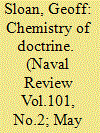

|
|
|
|
|
| Publication |
2013.
|
| Summary/Abstract |
The author, in a three part series examines the evolution of naval warfighting doctrine, with examples, and seeks to set out a grammar of doctrine.
Within the context of the present highly complex and shifting environment and in the face rapid technological change, it is not unreasonable to question the validity of doctrine - Albert Palazzo -2008
Knowing the enemy is the bedrock of the business of strategy: strategic theories in comparison, are second order problems. To concentrate on doctrine before enemies is to put the theoretical cart before the actual horse -a double error - Ken Booth, 1979
Doctrine is the box outside of which we need to think- Colonel Rory Copinger, Symes, Royal Marine-2010
|
|
|
|
|
|
|
|
|
|
|
|
|
|
|
|
| 2 |
ID:
128659
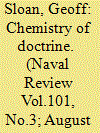

|
|
|
|
|
| Publication |
2013.
|
| Summary/Abstract |
In the second part of his series of articles, the author examines the development of naval doctrine through the 18th century, culminating in the production and publication of the fighting doctrine which informed the first world war, and governed the conduct of the battle of Jutland in 1916
|
|
|
|
|
|
|
|
|
|
|
|
|
|
|
|
| 3 |
ID:
128720
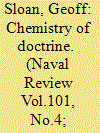

|
|
|
|
|
| Publication |
2013.
|
| Summary/Abstract |
In this the concluding part of his series on the chemistry of doctrine, the author examines the further evolution of naval doctrine during the second world war, with specific reference to the battle of Atlantic . He concludes by surveying the whole three part series and drawing some enduring lessons and principles.
|
|
|
|
|
|
|
|
|
|
|
|
|
|
|
|
| 4 |
ID:
109779
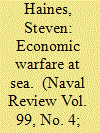

|
|
|
| 5 |
ID:
111706
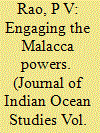

|
|
|
| 6 |
ID:
124280
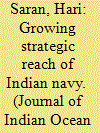

|
|
|
|
|
| Publication |
2013.
|
| Summary/Abstract |
India's nuclear deterrence capability has also matured and has been given concrete shape in the last nine years. The country already has the Agni series of ballistic missiles and fighters to deliver nuclear weapons. Moreover, it will finally complete its nuclear triad when indigenous nuclear submarine INS Arihant becomes full operational towards end 2013.
|
|
|
|
|
|
|
|
|
|
|
|
|
|
|
|
| 7 |
ID:
098319
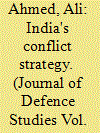

|
|
|
|
|
| Publication |
2010.
|
| Summary/Abstract |
Continued engagement with LOAC and IHL is ongoing with the Judge Advocates
General Department taking the primary role. Its training institution in Kamptee
is at the forefront. There has been increased interaction with the ICRC since
India opened up to the ICRC in the mid nineties, after initially being defensive
with respect to Kashmir. Not only has IHL been introduced into officer and
subordinate ranks courses, but guest lectures are also organised. Increased
scope of the engagement is possible, particularly if it finds mention in the next
edition of the Army doctrine. Increasing the scope of adherence to IHL, such as
by acceding to AP I and the ICC, can be debated. Even if India remains outside,
it can be expected that it would follow the tenets as a responsible power.
|
|
|
|
|
|
|
|
|
|
|
|
|
|
|
|
| 8 |
ID:
112190
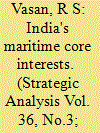

|
|
|
|
|
| Publication |
2012.
|
| Summary/Abstract |
While the maritime doctrine was published by the Indian navy in 2004 and improved upon in 2007, the core interests identified were as seen through the prism of the navy. The national maritime interests of India are distinctly different from the ones identified by the Indian navy and need to be analysed to understand the nuances and the dimensions of such interests so as to promote India's maritime power potential. The paper seeks to identify these core maritime interests and suggests a synergised approach for bringing all the stakeholders under a common umbrella to provide the necessary impetus for nation building and to provide leverages when required. Such a process would enhance India's national status as a maritime power of eminence in this century of the seas.
|
|
|
|
|
|
|
|
|
|
|
|
|
|
|
|
| 9 |
ID:
071694
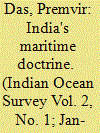

|
|
|
| 10 |
ID:
087991
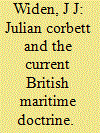

|
|
|
|
|
| Publication |
2009.
|
| Summary/Abstract |
It is widely claimed that the current British Maritime Doctrine is highly influenced by the ideas of British strategist and naval historian Sir Julian S. Corbett. These conclusions, however, rarely originate from systematic empirical investigations of the doctrine itself. The purpose of this article, therefore, is to investigate the intellectual bonds between Corbett and this particular doctrine. In order to bring structure and coherence to the investigation, distinctions are made between four different kinds of influence-formal and informal influence, as well as direct and indirect influence. Although Corbett's influence can certainly be established, it needs to be qualified in at least two respects: his ideas are much more influential in maritime/naval matters on the military-strategic level of war than on operational aspects, and his thinking often seems to be used to "intellectually" legitimize a proposition or a conclusion reached for other reasons. While focusing on certain aspects of Corbettian thinking and disregarding others, the authors of British Maritime Doctrine in fact often tend to quote not Corbett or his thinking, but rather his legend.
|
|
|
|
|
|
|
|
|
|
|
|
|
|
|
|
| 11 |
ID:
076296
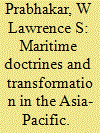

|
|
|